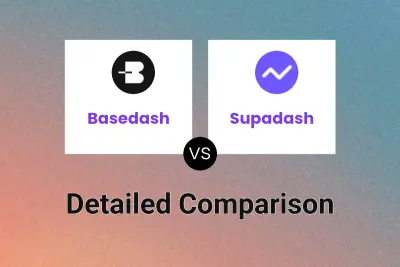 Basedash
VS
Basedash
VS
 Supadash
Supadash
Basedash
Basedash is a powerful data visualization and management platform that transforms databases into interactive workspaces. It provides teams with an AI-generated interface to visualize, edit, and explore their data without requiring any coding expertise.
The platform offers advanced features including custom CRM capabilities, dashboard building, AI-powered SQL editing, and real-time collaboration tools. With SOC II Type 2 certification, Basedash ensures secure data handling while enabling teams to work efficiently through automatic layouts, command menus, and comprehensive activity tracking.
Supadash
Supadash transforms raw database information into meaningful visual insights through AI-powered chart generation. The platform eliminates the need for manual SQL queries and provides instant visualization of metrics through an intuitive interface.
By connecting directly to databases, the tool automatically analyzes data patterns and creates relevant time series charts and analytics dashboards. This streamlined approach allows users to track key metrics and performance indicators without writing complex queries or dealing with multiple database interfaces.
Pricing
Basedash Pricing
Basedash offers Freemium pricing with plans starting from $25 per month .
Supadash Pricing
Supadash offers Freemium pricing with plans starting from $7 per month .
Features
Basedash
- AI Assistant: Suggests emojis, humanizes data, and streamlines view creation
- Automatic Layouts: Display data as tables, lists, or cards without configuration
- Command Menu: Fast workspace navigation and control through keyboard shortcuts
- Activity History: Track and roll back all edits, creations, and deletions
- Chart Generation: Automatic detection and visualization of time series data
- Cross-Platform Support: Desktop apps for Windows, Mac OS, and Linux
- Internal API Integration: Connect data sources to trigger business logic
- Collaborative Editing: Real-time multiplayer data editing capabilities
Supadash
- AI-Generated Charts: Automatic visualization of database tables
- Instant Dashboard Creation: Quick setup with database connection
- No-Code Interface: Visual analytics without SQL knowledge
- Real-time Metrics: Automated tracking of key performance indicators
- Multiple Project Support: Manage various database visualizations
- Database Integration: Direct connection to database sources
Use Cases
Basedash Use Cases
- Custom user CRM management
- Team dashboard creation
- Database administration
- Data visualization
- Team collaboration
- Business metrics tracking
- Customer data management
- Internal tool development
Supadash Use Cases
- Database Analytics Visualization
- Startup Metrics Tracking
- Performance Monitoring
- User Growth Analysis
- Data Pattern Recognition
- Business Intelligence Reporting
FAQs
Basedash FAQs
-
What is a page in Basedash?
Pages are the building blocks of Basedash that include views, queries, and actions across all teams in your workspace, including private pages for individual teammates. -
Are there any promotions for early stage startups?
Yes, Basedash offers extended trial periods and a partnership program where teams can pay with their feedback. -
Do you have special pricing for non-profits?
Yes, Basedash offers special pricing for non-profit organizations. Contact them directly for details.
Supadash FAQs
-
Does Supadash require access to my database?
Yes, Supadash needs database access to generate visualizations and charts from your data. -
Does Supadash store any of my data?
This information is not explicitly provided in the content. -
What databases does Supadash support?
This information is not explicitly provided in the content. -
How long does it take to get started?
According to user testimonials, you can get started and have charts generated in seconds after connecting your database.
Uptime Monitor
Uptime Monitor
Average Uptime
99.86%
Average Response Time
181.13 ms
Last 30 Days
Uptime Monitor
Average Uptime
99.86%
Average Response Time
123.2 ms
Last 30 Days
Basedash
Supadash
More Comparisons:
Didn't find tool you were looking for?
